Description
Origin:
Cumin is a spice made from the dried seeds of the Cuminum cyminum plant. It is native to the eastern Mediterranean region and India. Cumin has been used in cooking and medicine since ancient times, dating back to the Egyptians and Greeks.
It is a key ingredient in many spice blends, including chili powder and garam masala.
Cumin seeds can be toasted to enhance their flavor.
Other Names:
Yoruba: kumini
Igbo: Cumin
Hausa:
Health Benefits:
Digestive Health: Helps with digestion, reduces bloating, and alleviates symptoms of irritable bowel syndrome (IBS).
Antioxidant: Contains antioxidants that can help protect cells from damage.
Immune Support: May boost the immune system and help fight off infections.
Nutritional Information (per tablespoon):
Calories: 22 kcal
Carbohydrates: 2 g
Protein: 1 g
Fat: 1 g
Fiber: 1 g
Fun Fact: Did you know?
In ancient times, cumin seeds were so highly valued that they were sometimes used as a form of currency. They were exchanged for goods and services in certain regions, further highlighting the significance and desirability of this spice.
Uses:
Culinary: Adds a warm, earthy flavor to curries, stews, and spice blends.
Medicinal: Used in traditional remedies for digestive issues and respiratory health.
Baking: Sometimes included in bread and savory baked goods.
Recipes & Videos:
International Recipe: Cumin-Spiced Chicken Video: How to Make Cumin-Spiced Chicken
Local Recipe: Nigerian Cumin Rice Video: Nigerian Cumin Rice Recipe
Best Storage Method:
Store in an airtight container in a cool, dry place, away from direct sunlight and heat.
Shelf Life:
Whole: 2-4 years.
Ground: 1-2 years.

 Cart is empty
Cart is empty 





Reviews
There are no reviews yet